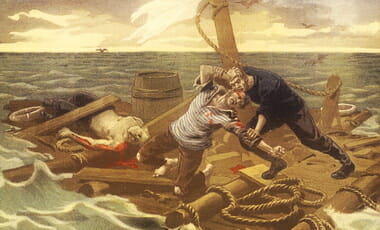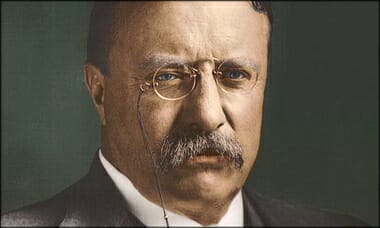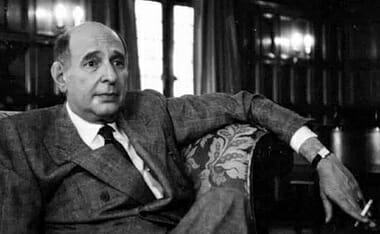The WASHINGTON FREE BEACON calls it like it is:
…Use of Indigenous Knowledge as evidence in Highly Influential Scientific Assessments poses serious risks, experts told the Free Beacon. “This is extremely dangerous,” said Anna Krylov, a professor of science, engineering, and chemistry at the University of Southern California. “When I conduct experiments, I need to follow the rules and procedures and think about safety. I have to keep track of what I’m doing. I’m not thinking about chants or dancing.” In addition to the Office of Science and Technology Policy memo, the White House has released more than three dozen documents that favorably cite Indigenous Knowledge. In one memo, the White House said Indigenous Knowledge is part of its “commitment to scientific integrity and knowledge and evidence-based policymaking.” In another, the White House said that science faces “limitations” given its refusal to incorporate Native religious principles. Federal agencies have held dozens of seminars on the topic as well. A March 2022 Environmental Protection Agency webinar entitled “Advancing Considerations of Traditional Knowledge into Federal Decision Making” featured an Indigenous Knowledge expert who explained that the “Native Worldview” does not consider time as “sequential” but rather “cyclical.” Another participant, Natalie Solares, who works for a tribal consortium, suggested paying tribal elders $100 an hour to assist in federal rulemaking. Gretchen Goldman, a senior official in the Office for Science and Technology Policy, lamented during the seminar that federal processes can be biased against “something that’s not a peer-reviewed academic document.” “There are places we can, you know, just remove any barriers to fully incorporate Indigenous Knowledge into the process the same way that we would for academic science,” she said. The U.S. Geological Survey drew on Native religious traditions in an April webinar called “Incorporating Indigenous Knowledges into Federal Research and Management: What are Indigenous Knowledges?” Federal regulators and scientists were told to consider whether various food cultivation methods were considered sacred by a Native tribe. Failing to do so would “disrespect the spirits,” said Melonee Montano, a traditional ecological knowledge outreach specialist for a consortium of native tribes. City University professor Massimo Pigliucci, a biologist and philosopher of science, told the Free Beacon: “When I start hearing things about how there’s this other dimension where, you know, the animals interact with humans at a different level of reality, that’s just not a thing. It’s not a scientific thing. You can believe that and you have the right to believe it, but it’s not empirical evidence.” San Jose State University anthropologist Elizabeth Weiss warned that official reliance on Indigenous Knowledge could easily go from “dumb” to destructive. She pointed to reports that a Hawaii official delayed the release of water that was urgently needed to fight last month’s deadly wildfires on Maui by requiring consultation with a local farmer. “The case is still out about the Maui fires and whether withholding the water was based on Indigenous Knowledge decisions, for example,” Weiss said. A critical problem with Indigenous Knowledge is that its definition is borderline circular: Nearly anything can be considered Indigenous Knowledge if it was declared so by a Native person. Gregory Cajete, a University of New Mexico professor who lectured NASA on “Indigenous Perspectives on Earth and Sky” in July, said in his book Native Science that it is “a broad term that can include metaphysics and philosophy” as well as “art and architecture” and “ritual and ceremony practiced by Indigenous peoples past and present.” “Much of the essence of Native science is beyond literal description,” Cajete wrote. Given the lack of clarity on the definition of Indigenous Knowledge, it is difficult to discern what role it can play in federal policymaking. Some tribes are working to keep it that way….. This story got me ranting in my head and now on my computer screen. Here is the story via THE DAILY CALLER: President Joe Biden’s administration hosted “Indigenous Knowledge” seminars, including one where a speaker admonished scientist attendees about “disrespecting” knowledge provided by “spirits,” according to a video uncovered by the Washington Free Beacon. The White House Office of Science and Technology Policy (OSTP) told dozens of federal agencies to adopt “Indigenous Knowledge” for “research, policies, and decision making,” in a November 2022 memo. In April, the United States Geological Survey (USGS) hosted a webinar titled “Incorporating Indigenous Knowledges into Federal Research and Management,” in which a speaker warned scientists about “disrespecting” indigenous knowledge, including “spirits.” “When you ask for knowledge and you take it and use it in a way that you didn’t intend or you misuse it, you’re not only disrespecting that individual that you sought that knowledge from,” Traditional Ecological Knowledge Outreach Specialist Melonee Montano said in the April webinar attended by scientists. “You’re disrespecting the teachers that they obtained the knowledge from. You’re disrespecting those spirits that may have brought that knowledge to them through a dream.” [….] The Biden administration promoted the OSTP to a cabinet-level agency in 2021. Moreover, the November OSTP memo also suggests collaborating with “spiritual leaders.” The White House has published over three dozen documents that positively reference “Indigenous Knowledge,” according to the Free Beacon’s investigation. A December memo states the Biden administration acknowledges that “Indigenous Knowledge … contributes to the scientific, technical, social, and economic advancements of the United States.” [….] Manuel prioritized incorporating “indigenous knowledge to the fields of water advocacy and management in Hawaii,” which allegedly could have contributed to the worsening of the Hawaii wildfires….. Nice to see [/sarcasm] the official doctrine of these Leftist idealogues are so captured by cultural relativism and multiculturalism that all practices boil down to being just as beneficial as other cultures actions/understandings. I guess all the past criticisms I have gotten as an armchair apologist serving some “sky god” that explained “lightning” is moot now. Having written and read the leading creationists and intelligent design authors throughout 3-decades… …and debating and pushing back on philosophical naturalism and it’s deleterious effects on science, I have been often accused of thinking that “god, or, gods,” cause natural phenomenon like lightning. And then it is quickly followed with, “since we have given up ‘sky gods’ and ‘superstitious’ beliefs, science explains these natural wonders better that our past primitive and religious explanations ever could. However, with the push for DEI (Diversity, Equity, and Inclusion) and the years of “cultural relativistic” position in multicultural pushes through the lens of Leftism, we have come to a place that not only destroys science but is reverting us back to what evolutionary atheists accuse [wrongly I might add] theists of. So here we are… full circle right back to paganism. Rather than the scientific revolution started and led by theists… the Left takes us back to primitive animism. Here are just some abstracts to exemplify this thinking creeping into science: I argue that it is rational and appropriate for atheists to give thanks to deep impersonal agents for the benefits they give to us. These agents include our evolving biosphere, the sun, and our finely-tuned universe. Atheists can give thanks to evolution by sacrificially burning works of art. They can give thanks to the sun by performing rituals in solar calendars (like stone circles). They can give thanks to our finely-tuned universe, and to existence itself, by doing science and philosophy. But these linguistic types of thanks-giving are forms of non-theistic contemplative prayer. Since these behaviors resemble ancient pagan behaviors, it is fair to call them pagan. Atheistic paganism may be part of an emerging ecosystem of naturalistic religions. — Eric Steinhart, William Paterson University, “Atheists Giving Thanks to the Sun,” July 2021Philosophia 49(20150711): 1-14 The traditional common consent argument for the existence of God has largely been abandoned—and rightly so. In this paper, I attempt to salvage the strongest version of the argument. Surprisingly, the strongest version of the argument supports the proposition, not that a god exists, but that animism is probably true and that such things as mountain, river, and forest spirits probably exist. I consider some plausible debunking arguments, ultimately finding that it is trickier to debunk the animist’s claims than it might first appear. I conclude that there exists one significant argument in favour of animism that has hitherto gone unstated in the philosophy of religion. — Tiddy Smith, University of Otago, “The Common Consent Argument for the Existence of Nature Spirits,” April 2020Australasian Journal of Philosophy 98(3) DOI:10.1080/00048402.2019.1621912 Animism has been defined in many ways. Tylor defines it as the “the theory which endows the phenomena of nature with personal life” (1866: 82). Bird-David lists several definitions of animism: “the attribution of life or divinity to such natural phenomena as trees, thunder, or celestial bodies”; “the belief that all life is produced by a spiritual force, or that all natural phenomena have souls”; the belief that “trees, mountains, rivers and other natural formations possess an animating power or spirit” (1999: S67). Brown and Walker say animism is “an ontology in which objects and other non-human beings possess souls, life-force, and qualities of personhood” (2008: 297). Coeckelbergh says, “For animists, objects have (individual) spirits” (2010: 965). According to Helander-Renvall, animism means that “there are no clear borders between spirit and matter…. all beings in nature are considered to have souls or spirit” (2010: 44). Smith says animism involves “belief in nature spirits, such as mountain spirits, animal spirits, and weather spirits” (2019: 2–3). Definitions like these are easily multiplied. — Eric Steinhart, “Scientific Animism,” Part of the Palgrave Frontiers in Philosophy of Religion book series (PFPR) | Animism and Philosophy of Religion POWERLINE noted this regarding “indegenouse knowledge vs. scientific knowledge… unless our government is acknowledging the science they push is “scientism” just as “indegenouse science” is “scientism: The Biden administration has released a “guidance” to federal agencies that calls on them to include “Indigenous Knowledge” in decision making: Today, the White House Council on Environmental Quality (CEQ) and the White House Office of Science and Technology Policy (OSTP) jointly released new government-wide guidance and an accompanying implementation memorandum for Federal Agencies on recognizing and including Indigenous Knowledge in Federal research, policy, and decision making. You may wonder, what the Hell is “Indigenous Knowledge”? Obviously, there is no such thing. There is just knowledge. Just as there is only science. Not “Indigenous Science.”…. Often these are driven by not only the genuflection created by multicultural relativism, but a Marxian “anti-capitalist/anti-West drive. For example: INTRODUCTION Animism is said to be the most fundamental form and starting point of religious belief (Stringer, 2013). This concept has been used in cultural anthropology since the late 1800s but, due to inconsistencies in research ontologies, fell out of favour as an ethnographic research tool (Bird-David, 1999). A return to, and modification of, this concept has been witnessed over the turn of the century as researchers seek to better understand how the tool may once again be utilized. In this essay I discuss how modern conceptualisations of animism may shape human/non-human interactions and relations. I provide a brief history of the concept and discuss how its limitations excluded it from cultural anthropology’s tool kit for the better part of a century. Following this, I outline the contemporary conceptualizations of animism, or new animism, and how they seek to address the term’s original misdirection. Modern use of animism in South India, South America and Burkina Faso highlight the variability within the concept itself as well as the consistency of relational epistemology: bridging the gap between the “self” and “other.” To conclude this essay, I explore the possibilities of Western (and global) integration of traditional peoples’ epistemologies to reduce Cartesian dualism of humans and nature, which contribute to the exploitation and degradation of natural beings. This is seen in the emerging field of ecopsychology, which seeks to address issues inherent in pro-environmental communication with the general public through a recalibration of philosophical understandings. [….] CONCLUSION From its roots as a misguided and derogatory concept to contemporary contextualisation, animism continues to provide cultural anthropology with a useful tool of ethnographic enquiry. The literature shows variation in animistic conventions throughout traditional peoples in different societies. However, a constant theme of relational epistemology persists in almost all of them. This distinction is not only important in understanding differences between traditional cultures but also for recognising limitations to the Western capitalist-driven, utilitarian ontology that has resulted in continued environmental devaluation and degradation. Acknowledging these flaws presents the potential to reconnect a sensual relation with the earth that suppresses, or even destroys, the Cartesian duality of human and non-human. This is not the place to get into the topic… but, “the Western capitalist-driven, utilitarian ontology” via the Protestant work ethic and ethos imported agricultural practices and inventions actually saved indigenous cultures. For instance, Vishal Mangalwadi notes just how missionaries carried these works to other cultures out of the Judeo-Christian worldview. (The entire chapter is a must read for the historian/economist): My people in India did not lack creative genius. They erected great monuments to gods and goddesses and built palaces for kings and queens. But our worldview did not inspire these same engineering skills to be directed toward labor-saving devices. My personal interest in McCormick is rooted in the fact that his widow, Nancy McCormick, financed the building of the Allahabad Agricultural Institute in my hometown, Allahabad, on the banks of the river Yamuna. My brother studied in this institute and, for a few years, I cycled there every Sunday afternoon to study the Bible. Between 2002 and 2006, from two to twenty thousand people— mostly Hindus—gathered there every Sunday for spiritual fellowship. This is significant because one of the holiest Hindu sites in India— the confluence of the holy rivers Ganges and Yamuna—is less than three miles from the Institute. As mentioned in chapter 12, practically every important Hindu holy man has come to this confluence during the last two thousand years; so have most politicians and wealthy merchants. Not one of them, however, ever started an institution to serve poor peasants. The Agricultural Institute, now a Deemed University, was established by Sam Higginbottom, a professor of economics in my alma mater.* He saw the plight of the peasants, returned to America to study agriculture, forged links with McCormick’s family, and returned to establish this institute. His purpose was to inject into Indian culture McCormick’s spirit of loving one’s neighbors enough to attempt to alleviate their suffering. Love is not a common ethical principle of all religions. No Hindu sage did anything like Sam Higginbottom did, because in order to be spiritual, the learned pundits had to separate themselves from the peasants, not serve them. The hallmark of Indian spirituality was detachment from worldly pursuits like agriculture. Therefore, the spiritually “advanced” in my country treated the toiling masses as untouchables. McCormick’s reaper reinforces the point made in an earlier chapter—that necessity is not “the mother of invention.” All agricultural societies have needed to harvest grain. But no other culture invented a reaper. Most cultures met this need by forcing into backbreaking labor those who were too weak to say no—landless laborers, servants, slaves, women, and children. McCormick struggled to find a better way. The driving force in his life becomes apparent when you notice that he gave substantial portions of his income to promote the Bible through several projects including newspapers** and the Presbyterian Theological Seminary in Chicago, which was renamed the McCormick Seminary. Cyrus was born to a Puritan couple, Robert and Mary Ann McCormick, in 1809, in a log cabin in Rockbridge County, Virginia. His Scotch-Irish ancestors came to America in 1735 with little more than a Bible and the teachings of the Protestant reformers John Calvin and John Knox. These reformers had embraced the Hebrew ideal of the dignity of labor. In addition, reformers, such as Luther and Calvin, introduced to the European mind the radical biblical idea that the calling or vocation of a peasant or a mason was as high as that of a priest or a monk. Every believer was a saint and ought to fulfill his or her vocation for the glory of God. In the words of sociologist Max Weber: But at least one thing [in the Protestant mind-set] was unquestionably new: the valuation of the fulfillment of duty in worldly affairs as the highest form which the moral activity of the individual could assume. This it was which inevitably gave every-day worldly activity a religious significance, and which first created the conception of a calling in this sense. . . . The only way of living acceptably to God was not to surpass the worldly morality in monastic asceticism, but solely through the fulfillment of the obligations imposed upon the individual by his position in the world. That was his calling”2 Cyrus McCormick didn’t like harvesting with a sickle or scythe. Had he lived before the Reformation, he might have escaped the drudgery of toil by going to a university or becoming a priest. This was normal in Orthodox and Catholic cultures. Even St. Thomas Aquinas—perhaps the greatest theologian of the last millennium— justified the tradition by advocating that while the biblical obligation to work rested upon the human race as a whole, it was not binding on every individual, especially not on religious individuals who were called to pray and meditate.*** The McCormick family rejected that medieval idea to follow the teachings of Richard Baxter (1615–91), the English Puritan theologian, scholar, and writer, who believed that God’s command to work was unconditional. No one could claim exemption from work on the grounds that he had enough wealth on which to live. Baxter wrote, “You are no more excused from service of work . . . than the poorest man. God has strictly commanded [labor] to all.”3 It is important to note that this work ethic, which made England and America different from Italy or Russia, was biblical—not Puritan per se. Quakers, like McCormick’s rival, Obed Hussey,**** shared the same worldview. This biblical work ethic, later called the “Protestant work ethic,” was driven into Cyrus from childhood. Both his friends and critics acknowledged that he was a workaholic***** with an indomitable perseverance and a bulldog’s tenacity. McCormick’s passion for focused work made him very wealthy, but his work ethic was a product of his religious culture, not his desire for wealth. The West’s rapid economic progress began when it adopted the materialistic spirituality of the Hebrew Bible (the Old Testament). For it is in Genesis that God declares the material universe to be good. Many ancient worldviews, such as India’s, had looked upon the material realm as intrinsically evil—something to be delivered from. Christian philosophers who studied the Bible noted that sin resulted in a breakdown of the relationship between God, man, and nature. The most influential exponent of this insight was Francis Bacon, who had a profound impact on the American mind.4 McCormick was nurtured on the biblical idea that through godly and creative work human beings can roll back the curse of sweat and toil and reestablish their dominion over nature. To repeat, my ancestors did not lack intelligence, but our genius was expressed in a philosophy that taught us to worship nature instead of establishing dominion over it. Economic development involves not worshipping but harnessing natural resources and energy for human consumption, albeit with foresight and a sense of stewardship. Francis Bacon’s exposition of the Bible instilled a non-fatalistic philosophy in England and America. It implied that the future could be better than the past. As explained in previous chapters, this Hebrew concept was born in Israel’s collective experience of God. When God intervened in human history to liberate them from their slavery in Egypt, the Hebrews learned that God could change their destiny for the better. And since men and women were created in God’s image, they, too, could forge a better future for themselves through creative efforts. This belief became an integral feature of modern Western culture and proved to be a powerful economic asset that would set the West apart from the rest of the world. While other cultures sought magical powers through ritual and sacrifice, the West began cultivating technological and scientific powers. McCormick’s grandparents, like most European Puritans who fled from religious persecution to the liberty of America, interpreted their experience as being similar to that of the Israelites being set free from the bondage of slavery. An important aspect of Moses’ mission was to teach God’s law to the Israelites. A cornerstone of this teaching was that while wickedness makes some individuals rich, it impoverishes entire nations. According to the Bible, a nation is exalted by righteousness.5 Cyrus’s forefathers believed that the blessings of righteousness were not exclusive to the Jews. God chose Abraham to bless all the nations of the earth. All true believers, they reasoned, were God’s chosen people. Therefore, it is wrong for God’s beloved to accept poverty as their fate. Even if one’s poverty were a result of sin, either one’s own or one’s ancestors, it was possible to repent and receive God’s forgiveness and the power to live a righteous life. It is not surprising, then, that within a century after Thomas McCormick’s arrival in Philadelphia, his grandson’s family owned an estate of twelve hundred acres. Cyrus’s family owned slaves, as did so many others of their time. They were products of their era and could have purchased more human labor to bring in their harvests. One difference the Bible made was that it demanded the McCormicks work just as hard as any of their slaves. We know that by the age of fifteen, Cyrus had despaired of seeing people slave in the fields. That’s when he resolved to build upon his father’s failed attempts to find a better method for harvesting grain. SPIRITUALITY OR GREED? The 2010 movie Wall Street: Money Never Sleeps powerfully shows how secularism confuses ambition and greed. Ambition is good, but it becomes greed when separated from moral absolutes. Greed is a destructive part of human nature. It brought to India not only Europeans, but also the Aryan and Muslim invaders. Greed explains the loot of Alexander the Great and Nadir Shah, but not the creativity of industrial capitalism. Pioneers of modern economic enterprise, such as Cyrus McCormick, did want to make money, but they were inspired by something nobler. FOOTNOTES * In India colleges function under a university chartered by the Government. Deemed University is a status of autonomy granted to high performing institutes and departments of various universities in India. I did my Intermediate studies (grades 11 and 12) at Jamuna Christian College, a part of Ewing Christian College, in Higginbottom’s time. Now independent, it is still located across the river from the Agricultural Institute. ** The modern press is a product of the Puritan revolution in England, and a substitute for the biblical institution of the prophet. A century ago, most newspapers in America were Christian. *** During the Middle Ages religious individuals were paid to sit the whole day and pray for the souls of their deceased relatives. In Hindu and Buddhist cultures, peasants provided for ascetics who did nothing besides meditate. **** Hussey patented his reaper in 1834 but lost the marketing race to McCormick. ***** The term “workaholic” is used only in a negative sense today. However, even our leisure-driven age accepts that no one excels in a given field and becomes a distinguished scientist, athlete, inventor, or businessman without working harder than her or his peers. 2. Max Weber, The Protestant Ethic and the Spirit of Capitalism, trans. Talcott Parsons (NY: Charles Scribner’s Sons, 1958), 80. 3. Richard Baxter, Baxter’s Practical Works, vol. 1 (Letterman Assoc., 2007), 115. 4. See for example, George Marsden, Fundamentalism and American Culture (Oxford: Oxford Univ. Press, 2006). 5. Proverbs 14:34. Righteousness exalts a nation, but sin is a disgrace to any people (Proverbs 14:34, CSB) Jay E. Adams, Proverbs, The Christian Counselor’s Commentary (Cordova, TN: Institute for Nouthetic Studies, 2020), 113. Crop rotation, largely a Western improvement, combined with the inventiveness of the West helped the indigenous cultures as well. Even the Native Americans largely “practiced slash and burn agriculture. When soils became infertile, wood for fuel was exhausted, and game depleted, whole villages moved” (Shepard Krech III, The Ecological Indian: Myth and History, W.W. Norton & Company; New York: NY [1999], p. 76). More on the history of this agricultural practice of “rotation” and top-soil. Crop Rotation One of the most important innovations of the Agricultural Revolution was the development of the Norfolk four-course rotation, which greatly increased crop and livestock yields by improving soil fertility and reducing fallow. Crop rotation is the practice of growing a series of dissimilar types of crops in the same area in sequential seasons to help restore plant nutrients and mitigate the build-up of pathogens and pests that often occurs when one plant species is continuously cropped. Rotation can also improve soil structure and fertility by alternating deep-rooted and shallow-rooted plants. The Norfolk System, as it is now known, rotates crops so that different crops are planted with the result that different kinds and quantities of nutrients are taken from the soil as the plants grow. An important feature of the Norfolk four-field system was that it used labor at times when demand was not at peak levels. Planting cover crops such as turnips and clover was not permitted under the common field system because they interfered with access to the fields and other people’s livestock could graze the turnips. During the Middle Ages, the open field system initially used a two-field crop rotation system where one field was left fallow or turned into pasture for a time to try to recover some of its plant nutrients. Later, a three-year three-field crop rotation routine was employed, with a different crop in each of two fields, e.g. oats, rye, wheat, and barley with the second field growing a legume like peas or beans, and the third field fallow. Usually from 10–30% of the arable land in a three-crop rotation system is fallow. Each field was rotated into a different crop nearly every year. Over the following two centuries, the regular planting of legumes such as peas and beans in the fields that were previously fallow slowly restored the fertility of some croplands. The planting of legumes helped to increase plant growth in the empty field due to the bacteria on legume roots’ ability to fix nitrogen from the air into the soil in a form that plants could use. Other crops that were occasionally grown were flax and members of the mustard family. The practice of convertible husbandry, or the alternation of a field between pasture and grain, introduced pasture into the rotation. Because nitrogen builds up slowly over time in pasture, plowing pasture and planting grains resulted in high yields for a few years. A big disadvantage of convertible husbandry, however, was the hard work that had to be put into breaking up pastures and difficulty in establishing them. It was the farmers in Flanders (in parts of France and current-day Belgium) that discovered a still more effective four-field crop rotation system, using turnips and clover (a legume) as forage crops to replace the three-year crop rotation fallow year. The four-field rotation system allowed farmers to restore soil fertility and restore some of the plant nutrients removed with the crops. Turnips first show up in the probate records in England as early as 1638 but were not widely used until about 1750. Fallow land was about 20% of the arable area in England in 1700 before turnips and clover were extensively grown. Guano and nitrates from South America were introduced in the mid-19th century and fallow steadily declined to reach only about 4% in 1900. Ideally, wheat, barley, turnips, and clover would be planted in that order in each field in successive years. The turnips helped keep the weeds down and were an excellent forage crop—ruminant animals could eat their tops and roots through a large part of the summer and winters. There was no need to let the soil lie fallow as clover would add nitrates (nitrogen-containing salts) back to the soil. The clover made excellent pasture and hay fields as well as green manure when it was plowed under after one or two years. The addition of clover and turnips allowed more animals to be kept through the winter, which in turn produced more milk, cheese, meat, and manure, which maintained soil fertility. Missionaries are still teaching people this today: ….The program also ensures that the innovative farming methods are accessible to the very poorest subsistence farmers. The methods taught do not require plows, expensive tools, or commercial fertilizer. Every single technique taught could be done for free. If a job needed a tool, the teachers learned how to improvise using trash—for example, using a bottle cap or jam can instead of a measuring cup. They learned how to save and store seeds to avoid repeated annual expenses, and memorized recipes for creating homemade compost. “If you want to reach the heart of God, you have to make a plan for the poor,” the instructors said again and again. By reaching the poor with tangible, relevant skills that will help them better survive and thrive, MTW missionaries and their national partners are not only following God’s commands, they’re revealing the heart of God to their neighbors, building bridges for trust and relational evangelism. “Jesus fed people; Jesus healed the sick; Jesus addressed physical needs as well as spiritual needs,” Sarah said. “I think that, as the Church, we’re called to do that as well. Food and growing food is something that everyone in the world has in common. That’s why I got into agriculture to begin with, and I think it’s a huge way to get into communities. … Especially for subsistence farmers in African contexts, it’s just so insanely relevant. If you can tie the gospel to planting a seed, to that seed sprouting, to the rain coming, to this thing they spend their entire day, their entire life, doing—how powerful is that?”













